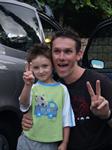Psychology distance learning course. A solid foundation course in Psychology - study a wide range of theories and research.
Self-paced study in the comfort of your own home.
Psychology is the study of the human mind and behaviour.
The course has seven lessons and lasts approximately 100 hours. In the course, you will learn more about -
 Different psychological approaches.
Different psychological approaches.- Psychological theories.
- Neurological impact on behaviour.
- Phineas Gage Case study.
- Theories of personality.
- Theories of psychological development.
- Psychosexual development.
- Consciousness and Perception.
- Needs, wants and motivation.
All the way through the course you will be supported by our highly experienced, well qualified and friendly psychology tutors. You study online and can start the course at any time to suit you.
Lesson Structure
There are 7 lessons in this course:
-
The nature and scope of Psychology - Different approaches to psychology. It's all common sense isn't it? Key issues in psychology, free will and determinism, applying psychology, developing questionnaires.
-
Neurological basis of behaviour - Structures of the nervous system, central nervous system, peripheral nervous system, how nerves transmit messages, the brain and method, methods of investigating the brain, brain damage, the strange case of Phineas Gage, split brain operations, localisation of function.
-
Environmental effects on behaviour - Learning and behaviour, modelling, conditioning, extinction, punishment, learning and memory, memory improvement strategies,
-
Consciousness and perception - Status of consciousness in psychology, nature of consciousness, relationship between consciousness and perception, unconscious and subconscious, altered state of consciousness, day dreams, sleeping and dreaming, chemically altered perception, perception, selective attention, factors affecting perception, perceptual biases.
-
Personality - Theories of personality, personality traits, theoretical approaches to human personality, id, ego and superego, Oedipus Complex, Electra Complex, psychological defence mechanisms, genes and personality, personality disorders, multi-trait theories.
-
Psychological development - Nature vs nurture, environment and development, stages of development, moral development, psychosexual development, psychosocial development, adolescence, adult psychological development, criticisms of stage theories.
-
Needs, drives and motivation - motivation, behaviourist theories of human motivation, drives, Maslow's theory of human motivation, complementary and conflicting motives.
Aims
-
Explain the nature and scope of psychology.
-
Explain characteristics of the neurological basis of behaviour.
-
Explain environmental effects on behaviour.
-
Explain the differences between consciousness and perception.
-
Explain the effect of personality on behaviour.
-
Explain psychological development.
-
Apply different techniques to motivate people.
What You Will Do
-
Define different psychological terms such as ambivalence, apathy, behaviour, catalyst, cognition, empirical, fixation, homeostasis, obsession, perception, performance, psychosomatic, socialisation, stereotype, temperament, trait.
-
Explain how a knowledge of psychology can be applied in different types of jobs.
-
Explain risks involved in applying psychology in two different specified situations.
-
Differentiate between developmental and interactive explanations of behaviour, in a case study.
-
Describe how the nervous system functions to transmit messages throughout the body.
-
Explain how the dysfunctioning of different parts of the nervous system, can influence behaviour.
-
Compare the function of the left and right hemispheres of the brain.
-
Explain two examples of conditioning, which you observe.
-
Explain an example of behaviour affected by modelling, observed by you
-
Compare the likely effects of positive and negative reinforcement in a case study.
-
Distinguish between consciousness and perception, in the attitude of an observed individual.
-
Explain selective attention, in a case study.
-
Explain in summaries, different states of consciousness including daydreams, sleeping and dreaming, meditation.
-
Explain the relationship between consciousness and behaviour in a case study.
-
Explain three different theories of personality.
-
Distinguish between the "id" and "superego" in a person you are familiar with.
-
Compare the application of humanistic approaches with the social learning approach with the psychoanalytic approach, in educating children.
-
Explain through examples, different defence mechanisms, including repression, displacement, rationalisation, projection, denial, evaluation, sublimation, reaction/formation, intellectualisation
-
Explain the factors which may have influenced the psychological development of a teenager who you know.
-
Compare cognitive development with physical development, in a case study.
-
Explain through a summary, the four main stages of development including sensorimotor, pre-operational, concrete operational, formal operational.
-
Explain moral development in two different case studies.
-
Explain psychosexual stages of development in a case study.
-
Explain psychosocial stages of development in a case study.
-
Distinguish between needs, drives and instincts in a specific workplace.
-
Explain the cyclical nature of primary drives, in a case study.
-
List examples of secondary drives.
-
Explain how to motivate a worker in a specified situation using the psychoanalytical approach.
-
Summarise Maslow's theory of human motivation.
-
Demonstrate the application of three different motivation techniques, in three different specified situations, through role playing.
Sample Course Notes - Psychology can Help You in All Aspects of Life

Through psychology, we seek to understand human behaviour, and the things that affect our behaviour.
It is natural for mankind to continually ponder whether it is nature (genetic make up) or nurture (our environment, other people, events); which influence us more.
Although a person’s behaviour is largely influenced by their environment, there are certain characteristics that are predetermined by the person’s biological make up. Some of these characteristics are common to all people (to all human beings) while others may be specific to different people. For instance, all normal infants have a startle reflex, and all tend to be fearful of heights. Some children, however, seem to startle more easily because their neurons fire more anxiety messages. If a person’s nervous system is damaged, it might be impossible for them to name another person even though that other person is familiar to them. These are matters investigated by neurobiological psychology, which is concerned with the relationship between the person’s biology and nervous system and their psychological make up and behaviours.
The nervous system is not completely developed upon birth, but continues to develop as the body matures, and we become capable of more complex physical and psychological activities. Maturation is the process of growth development which enables a person to learn a new form of behaviour. Most maturation processes are complete in the human being before the age of twenty. The two periods which involve the most rapid maturational changes are the first five years of life, and puberty. In an infant, the cerebral cortex is incomplete, and the synapses that allow messages to pass from one nerve to another are not yet linked to the appropriate nerves. Also, the axons, which are crucial in the transmission of messages between nerves, lack the myelin sheath, an insulating sheath that allows for much more rapid transmission of messages. The lack of the myelin sheath prevents the infant from controlling the lower parts of its body. Myelination and development of synapses continues into adolescence, and perhaps even into adult hood
Learning
One important aspect of learning is memory. If we did not remember past experiences, conditioning would most likely not work. For cognitive psychologists, conditioning works only because we process information and recall it, and use it to decide on appropriate responses at other times. Cognitive psychologists also emphasise the individual’s control over learning through the intention applications of memory. To understand how memory can be applied consciously to improve learning, let us examine the multi-store model of memory.
According to the model, there are three parts to memory:
- Sensory or iconic memory (SM - which is really a registering of information before we have a chance to think about it).
- Short term memory (STM - where information that we attend to is briefly stored - for a few seconds).
- Long term memory (LTM - which stores information that has been consciously or unconsciously reinforced for much longer periods, perhaps for our lifetime).
Memory is supposedly stored in a process that moves the information from part 1 to part 2 to part 3. The main factors in the transferral of information from sensory to short term memory are attention and time. Information that is not quickly transferred to the STM is lost. The SM can hold large amounts of information, and most of it is lost in this way because we have not attended to it quickly enough. (Actually, we could not attend to it all anyway, so we usually perceive only that which is relevant in some way to us at that time).
This course is an ideal foundationto learn more about psychology
- If you are going to only study one psychology course, this is probably the one.
- If you are wondering which psychology course to study first -this is the one.
What Do Our Psychology Students Think?
" The online courses are very easy to use and follow. Prompt friendly replies from tutor to any queries. Course structure flows freely. Very satisfied with course and results..."
-Diana (completed ACS Online course in Introduction to Psychology and Psychology And Counselling)
Who is this course suitable for?
Well, anyone who is interested in psychology. It can be
your starting point for managing human behaviour, or the first step
toward further studies and a career in counselling, psychology or
personnel management.
The course could be useful for -
- social workers

- teachers
- parents
- foster carers
- support workers
- carers
- law enforcement personnel
- solicitors
- lawyers
- youth workers
- community workers
- human resources staff
- personnel
- training staff
- conflict negotiators and mediators
- anyone with an interest in understanding more about how human beings think.
Is This The Course For You?
The answer is yes if you are interested in gaining more knowledge of psychology.
- This is an excellent starting point to learn more about psychology.
- Study in your own home and at your own pace with support from our tutors.
Take this course as the start to your journey to learning more about psychology and how people think.
Any Questions?
